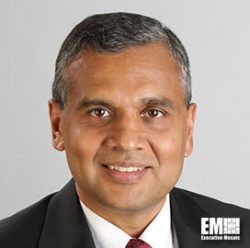“…the solutions [BAE] develops today will (likely) become the backbone of tomorrow’s artificial intelligence solutions…We are positioning ourselves to be on the cutting edge of these breakthroughs so we can help lead the way.”

EM: How did your background and previous roles prepare you for your role as VP of business development and strategy with BAE?
Manish Parikh: I have more than 25 years of experience providing Programmatic, Operational, and Technical leadership for IT Service Management; Cybersecurity Operations; Intelligence Services; and System and Software development. Along the way, I’ve served in various capacities including engineering, project lead, CTO, technical director, and program director roles – before moving into business development and strategy. As a result, I have a unique appreciation and understanding for the role our solution architects and engineers, as well as the operations teams play in support of our customers, which helps me build connections with the broader team in ways many. I guess you can say that I know how to speak the language, since I’ve been “in the trenches†and appreciate the complexities of customer relationships, managing people, and contract requirements.
EM: What technologies will have the greatest impact across BAE Systems’ Intelligence & Security market in the next three to five years?
Manish Parikh: There are tremendous opportunities for business growth with cloud computing, from developing the secure infrastructures to providing managed services. There is also demand for solutions to support the customers with cyber hardening of platforms and critical infrastructure as well as modernizing current IT infrastructures. Data analytics will also continue to drive new requirements. Today, we are actively partnering our expertly trained intelligence analysts with our industry-leading developers to create the next generation of analytic tools. It’s exciting to think that the solutions we are developing today will likely become the backbone of tomorrow’s artificial intelligence solutions. The future of our business will largely be driven by solutions which enable our customers to manage, secure, and operationalize their data more efficiently and effectively. At BAE Systems, we are positioning ourselves to be on the cutting edge of these breakthroughs, so that we can help lead the way.
EM: How has the data analytics field evolved, and in what ways is it helping the federal contracting industry?
Manish Parikh: Taking a strategic approach to analyzing the data enables you make more informed decisions, which leads you to executing more precise tactics in pursuit of opportunities. All of this leads to developing business strategies that have better odds of success. For example, my business development organization utilizes data analytics to better understand our markets – from where the opportunities are, to who our likely competitors will be, to the solutions we should develop. We also gain a better understanding about what new offerings we should be investing in, and who we need to partner with in our industry to deliver the best possible solutions for our customers’ current and future challenges. In short, the evolution of data analytics is also evolving the way government contractors approach business development by making the process more efficient.
EM: What are some of the challenges you see facing intelligence and security sector?
Manish Parikh: The competition to hire individuals with the necessary skills, experience, and security clearances is already very intense. We are up against our industry competitors as well as businesses in the non-Defense sectors, such as banking. One of the ways in which we are addressing this problem is with a robust internship program – which is creating a strong pipeline of talent. Each year I am amazed at these bright minds and the creative ways in which they are solving problems. They are actively contributing to our business during the summers, then joining the company upon graduation.




